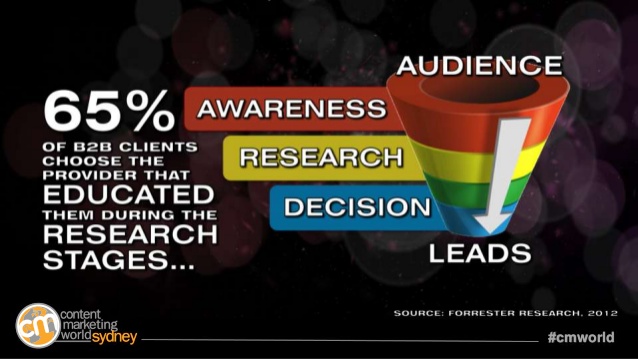You know what scares me? Nearly every client I speak with tells me they’re a sales-driven organisation. That’s a big problem if you ask me, especially when you consider my clients work in marketing. I spent five successful years working in direct sales. Trust me when I say the last thing you want is to have your sales department setting the agenda for content marketing.
I cut my marketing teeth when I was working as a salesperson. When I didn’t have the content I needed, I started writing my own. The very last thing a business wants is to have salespeople creating their own content. I could go into the myriad reasons why but that’s another post, if not a whole series. Suffice it to say that even if your salespeople can write, they won’t tell the story that’s going to ensure long-term success and future sales for your company. They’re going to tell the story that gets them to the next sale. It’s quite likely the content they create on their own will be ineffective. In the worst-case scenario, marketing will end up in some sort of damage control when the customer begins to realise they’ve been sold a bill of goods.
Here are 9 reasons why you don’t want a sales-driven organisation:
- Marketing becomes reactive. When the sales department is setting the agenda for content, marketing spends all their time reacting – putting out fires, cranking out copy under pressure of deadline and trying to cobble together a story based on a hodgepodge of emergencies.
- Salespeople have different goals. Salespeople have very definite goals that almost always revolve around making their own quota. Even if they’re set up to sell a solution or work within a larger team, any good salesperson is going to pull out all the stops to ensure their quota is met as a first priority. If they’re setting the agenda for content, you’re likely only to produce content for the bottom of the funnel even though that’s a disaster for a long-term strategy.
- Salespeople don’t like to change when something works. Once a salesperson has had a success, i.e. earned commission from a sale, it’s nearly impossible to get them to change the way they work. They will want you to keep producing the same infographic, video, white paper or case study they think helped them close business. Again, you’ll be chopping and changing tactics with no real strategy behind the effort.
- Good salespeople have a narrow focus. Honestly, all they care about is their product. Sure, they’ll give lip service to a broader story within the organisation. But unless they can earn money from it, they’ll push their portfolio at the expense of everything else. Marketing needs to tell the whole story.
- The tail shouldn’t wag the dog. Marketing’s job is to create content and messaging that populates a sales funnel and pushes prospects out the bottom as customers. Salespeople are only focused on the bottom of the funnel, and they will consistently insist on content and tactics to address the bottom of the funnel. When marketing is driving things, a lot more activity is coming into the top of the funnel. Content marketing can keep people moving through the funnel and even capture people who want to enter at different stages.
- The most successful salesperson gets to set the agenda. When you get to the 3rd quarter of a financial year and the numbers aren’t shaping up, good intentions go out the window and everyone goes into hard sell mode. The most influential people in a sales organisation instantly become the ones who have the best ability to bring in business. Salespeople chasing quota adopt a tunnel-vision approach to getting the sale, and everyone in the organisation is instructed to do whatever it takes to support them. These people will not consider the next quarter, the next year or the next five years when making content demands. Your content marketing takes on a very narrow focus with a short shelf life.
- Salespeople are transient. You’re only as good as you next sale and the award-winning hero of the sales department can easily be looking for a job six months later. Good salespeople are huge targets for poaching. Often motivated by money, it doesn’t take a lot to woo them to another company. If the architect of your content marketing is a salesperson, chances are you’ll be constantly changing direction with each new person coming into the department.
- When panic sets in, things get ugly – for marketing. When they’re not making their quota, salespeople start trying to place blame and marketing is always first on the list. If you’ve done exactly what they asked and it doesn’t work, you’ll be blamed for not doing your job. And, to be honest, marketers who let sales set the marketing strategy should wear that blame.
- Creativity is stifled. The battle cry at Content Marketing World Sydney was “Be creative.” When your sales staff is writing content on the fly to suit a particular sale, I guarantee you they aren’t being creative. They’re churning things out as quickly as possible, probably working late into the night to get it done. At best you can hope for competence in the finished result but I wouldn’t count on it. No matter how earnest their effort, it’s not going to be the kind of content that becomes an asset to your business.
Some of my best friends are salespeople
Does it sound like I’m being hard on salespeople? Not at all. I know these things are true because I’ve done that job. I know what it takes to make quota and nothing, especially the marketing department, could stand in the way of a goal-oriented salesperson. (If they’re not goal oriented, you probably need to start looking for a replacement. #justsaying) In most sales organisations, if you underperform you’re not going to have a job for very long so these people are often working under immense pressure.
Strategy is the only key to success
The only way to get out of the reactive cycle created by a sales-driven culture is to change to a marketing-driven organisation. Content marketing implemented with a sound strategy is the perfect foil. Mark Schaefer spoke about how to do this recently in Sydney in his Content Marketing World keynote address. He believes content can be the centre of power for an organisation. Likewise, Robert Rose has introduced the idea of a Content Creation Management (CCM). He envisions CCM operating as a corporate group responsible for the company story and guiding all other content including sales collateral, PR and training. When content is at the centre of an organisation, the sales department have a lot more time to focus on selling and less time trying to concoct a story they think will get them to quota.
The mandate has to come from the top
I’m not in any way claiming this is an easy shift. In fact, it’s quite likely a hard slog requiring many skirmishes if not downright power struggles. It’s vital the C-Suite supports and endorses a content strategy or you might as well sharpen your pencils in anticipation of the next content demand from the sales department. Jonathan Crossfield frequently writes and speaks on how to win the C-Suite over to content marketing. I recommend you get in touch with him for advice on what to do and what to avoid doing.
What marketers have in common with the tortoise
If you haven’t already figured it out, this is a story about the tortoise and the hare. Sales is a sprint and good sale people want all obstacles removed from their path. Marketing, on the other hand, is a marathon. Careful preparation and a strong content strategy is the best way to guarantee success and pave the way for sales. You can’t have sales drive marketing any more than you can take a sprinter’s approach to a marathon. Marketing needs to drive the organisation. When that happens, there’s not a salesperson that complains about it.




Recent Comments